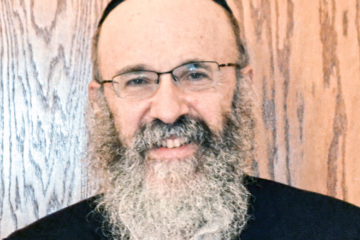Tisha B’Av blues
By Rabbi Shmuel Klatzkin, Chabad of Greater Dayton
Hot enough?
At that point of the year when the heat is usually at its hottest, when it’s hard to bear and we seek relief — that’s when we find the anniversary of national disaster, Tisha B’Av, an anniversary of such horrors as the destruction of both Temples in Jerusalem, the fall of Betar, the expulsion from Spain and the beginning of the 20th century’s World Wars.
These were horrific events. To contemplate them is as uncomfortable to our spirits as the weather is to our bodies.
Just as we seek the escape of a good air conditioner or a trip to the mountains or the seashore, so too, with Tisha B’Av — we’d rather be somewhere else.
There is good reason for that. We ought not indulge ourselves in negative feelings. There is no need to be an ascetic showman, like Kafka’s Hunger Artist, no need to wallow in discomfort for its own sake.
Yet travel down the road a bit. One hot summer a few years back, my kosher supervision duties brought me to the Mississippi Delta country, driving along U.S. Highway 61.
The sun beats down with force there this time of year, and the heat lifts slowly, if at all, at night. Not much air conditioning in some of the places you see off the highway; it’s some of the poorest country in the U.S.
Yet it has been the cradle of one of America’s most powerful, original and influential art forms: the blues.
The power of the blues depends on the authenticity of the emotions it channels. The deep heat of the music comes straight from the life lived under this scorching sun with little escape possible; and the human environment has been at least as harsh.
One cannot fake the emotions that drive real blues. Only someone who owns the emotions of life in all its difficulties can bring any comfort through its music, any power of relief and redemption to someone else who has lived under that merciless sun.
For that reason, our own tradition teaches us that simply focusing on love of God is not enough. Certainly, love is essential to us and to God’s plan. If we give up on love, our lives turn sour and false and become a mere counting of the hours before the inevitable end.
But it is not enough by itself. We must be able to go into the places where the heat has burned away every bit of comfort, where there is no indulgence, a place where the ego falters and we no longer can rely on anything any more.
The place in which we are alone before the awesome, fearsome truth of reality and all we feel is our smallness. This is the territory of yir’at Hashem, the mitzvah (commandment) of the awe of God.
This is no comfortable, armchair feeling, like watching a television special about the Serengeti or the Grand Canyon. This is rather a place of the soul where one cannot go as a tourist, in which all our pretensions are burned away, and where we know exactly how much we flinch.
Fear of God by itself is also insufficient. We would simply be consumed by it in our place — nothing would be left. Always, there must be present the striving for love that makes us pour out our emotion into the words and music of life.
Accepting that this fearsomeness is real — that it is a mitzvah — this gives us an authenticity that can survive and triumph. In a world in which people seek constantly to manipulate us, to gain our wealth and our power, authenticity shines out unmistakably.
In a cynical world, in which the grandest slogans are used to cover the most ruthless aims; in a world in which Iran chairs the Commission on Human Rights and Israel is routinely assailed as an apartheid state, we know at last that there is nothing for us to do but embrace the mitzvah.
Let us face the fearsome reality that Tisha B’Av marks. We have known failure and pain and deep sorrow, terrible inadequacy in the face of forces far beyond our control.
Facing that in the stance of mitzvah releases our song, our unquenchable love burnished and purified, whose authenticity breaks down all barriers and will not be stopped until the webs of manipulation are broken and all hearts are free.






